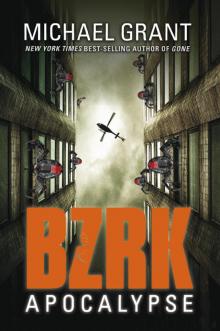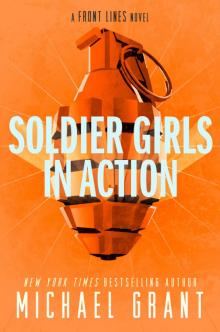- Home
- Michael Grant
Front Lines Page 22
Front Lines Read online
Page 22
In her free hand she holds the letter she’s already read through several times. Obal has taken over his buddy’s paper route, Pastor M’Dale has won an award from the NAACP, and the labor shortage as men and women flood into defense plants has created an unexpected opportunity for her father.
Her father is dispatching taxis, a job he can do from a chair. He is earning a living. The family finances are saved. They aren’t well-to-do, certainly, but neither will they lose their home or go hungry.
You can come home now, baby.
That line is as sickening as the effects of the waves. Frangie enlisted to save the family. So she could contribute her allotment. It is the sole reason she signed up, the sole reason she is here on her way to North Africa in this follow-up to the successful American landings at Algiers and Oran.
She wants to ball the letter up and throw it away. Or burn it. Or rip it into tiny pieces and scatter them overboard.
Camp Szekely, Fort Huachuca, that hellish hospital ward near Manchester, two reeking, miserable ships, all to save a family that no longer needs saving. And her mother writes as if this will be happy news.
You can come home now? Frangie pulls the rolled-up coat she uses as a pillow from beneath her head, wads it up over her mouth, and screams into the rough wool.
The letter reached her in England as she was being herded along with thousands of others from ship to truck to train to truck to ship. Mail call, normally the happiest of times, had turned very dark very quickly.
As she’s screaming a hand roughly shakes her shoulder. She pulls off the “pillow” and stares at an amused white sailor.
“What?” she snaps.
“Your lieutenant volunteered you. Sick bay is ass-deep in bruises and broken bones, dumb-ass coons not knowing you keep a hand for yourself and a hand for the ship, falling down hatches and—”
“What?”
“They need a Nigra medic to help with some of the coloreds. Tag: you’re it.”
She follows the sailor down labyrinthine corridors whose walls and floors will not stand still, up stairs that almost seem to change direction as the floor falls away, across just enough open deck to leave her drenched, and finally arrives at the sick bay.
Sick bay is roomy by contrast with her berth, but still no bigger than a pair of parlors. One room is distinctly for whites, the other definitely for colored. There’s a white doctor muttering to orderlies as he moves between the white beds, pointing at fractures, prodding at bruises, and ignoring anything said to him.
The injured black soldiers are receiving even less care, with one sour-faced white orderly and two black privates who are clearly at a loss. Frangie spots a familiar face. Sergeant Green has just heaved a loudly complaining soldier off his shoulders and onto a gurney that is already occupied.
It’s the wounded man who, despite having what looks like a sprained ankle, recognizes Frangie.
“Hey, it’s the little soldier girl.”
Sergeant Green looks, sees Frangie, and greets her with an annoyed, “Help me with this fool.”
Frangie helps to prop the wounded man in place beside the other man on the gurney and, seeking no further conversation with the obviously seething Sergeant Green, gets to work with gauze and tape and splints. She works for two hours without letup, caring for perhaps fifteen injuries, and by then the sea has gentled and Sergeant Green surprises her with a cup of hot coffee.
“Here.”
She does not drink coffee. Until now. She takes the cup.
“Thanks for helping out,” Sergeant Green says. Then, checking to make sure that he is not being overheard, he says, “I didn’t mean to snarl at you.”
“It’s fine, Sergeant,” Frangie says, taking a sip. He has added sugar to it, and some milk, and it tastes delicious.
“I’m going to get some air and have a smoke. You?”
She doesn’t smoke, but she would like some fresh air, so she follows Sergeant Green out onto the deck to get a cold, wet, salty slap in the face that makes her laugh.
“Where you from, Private Marr?”
“Greenwood.” And when he shows no recognition, adds, “Tulsa, Oklahoma. Also, most people call me Frangie.”
She winces, embarrassed by her name. It’s a little girl’s name, really, and she wishes she’d said Francine.
He extends a hand and says, “Walter,” earning a giggle from Frangie that she instantly regrets and tries to take back by covering her mouth.
“It’s all right,” he says tolerantly. “I guess I don’t look like a Walter. Everyone gets a laugh at that.” Then, staring at her sideways, he adds, “One laugh. Just one.”
“And you’re from . . .”
“Iowa.”
“You’re joking. Walter from Iowa? I didn’t know there were any colored folks in Iowa.”
“Well,” Walter says laconically, “now that I’m here I guess we’re down to about three left in the state: my mom and my two little sisters.”
“Do you mind if I ask what you do in real life?”
He shakes his head slowly, as if he can’t quite believe what he’s about to say. “During the week I design trailers. You know, what we call mobile homes. I’m an engineer.”
Frangie nods. That at least fits, somehow.
“On weekends I play a little bass.”
“In a jazz band?”
“Well, I don’t know I’d call us a band. More like four fellows who like to get together of a Saturday night. Play some Dixieland for the white folk, and maybe some blues for the college kids.”
Frangie looks more closely at him. He’s removed the glasses and stuck them in his pocket—they’d steamed up—and without them she sees the laugh lines they’d concealed. He doesn’t look so old now, probably no more than twenty-one, maybe a year in either direction. She notices as well the tiny veins of gold within the deep brown of his irises, and then quickly looks away, feeling very confused.
Apparently Walter Green feels equally confused, because he flicks an only-half-smoked cigarette into the wind and says, “Well, I better get back to it. Good evening, Private.”
“Good evening, Sergeant.”
And just like that they are sergeant and private again, not Walter and Frangie.
Back at her bunk, Frangie draws the offending letter out again. She is still angry about it and wants to revel anew in that anger. But instead she whispers, “Walter?” And then, “Iowa?”
Rainy Schulterman is in her own bunk, one just slightly less fetid as befits her rank. She is reading an Italian-to-English dictionary and whispering her attempts at pronunciation.
“Birichino . . . biscia . . . bloccare . . .”
A sailor passes by carrying a length of thick hose. He stops, walks backward, puts on a big, toothy grin, and rests his free hand on the side of her bunk.
“Well, hello there, pretty girl,” he says. “Are you trying to learn Italian? The language of love? Because I could help with that. My folks were right out of Pontassieve. Capisci?”
Rainy stares at him and says nothing, which unsettles the sailor a bit.
“So,” he says. “What’s your name, babe?”
“Mussolini,” she says.
“Ah, you’ve got a sense of humor. I like a girl with a sense of humor, likes a laugh. Where you headed?”
Rainy points toward the front of the ship. “South,” she says.
Which is when the sailor realizes he’s getting nowhere, and walks on.
Several hours later, deep in the night, Rio wakes suddenly.
“Oh my God, did I . . . ?”
From the bunk below comes Jenou’s voice. “You did. But hopefully he’s too drunk to remember.”
22
RIO RICHLIN—OUTSIDE TUNIS, TUNISIA, NORTH AFRICA
“All right, Second Squad, gear up.” Sergeant Cole speaks around the cold cigar in the corner of his mouth. He’s broad rather than tall, with a potato of a nose, a wide mouth with gapped teeth more or less always clenching a cigar, which is seld
om lit. He’ll be bald at an early age; his dishwater-colored hair is already beginning the retreat. He is not loud or overbearing as some sergeants are, but he has the gift of authority, despite the fact that he is quick to break out a grin. Where Sergeant Mackie was stern with a tight-wrapped and seldom-glimpsed sense of humor, Sergeant Cole is a man who is prepared to be amused by life.
GIs being GIs, Cole’s announcement is met with the usual grumbling and the busting of chops.
“Aw, man. Haven’t even had any hot chow.”
“More hurry up and wait, probably.”
“What happened to mail call? That’s what I want to know. I was supposed to get some cookies from my aunt,” says Jenou.
“Anyone got a spare bootlace? I’ve already knotted this thing twice.”
“Sarge,” Cat says, “Private Castain can’t fight without cookies.”
“My boots still ain’t dried out,” Kerwin complains. “Be a hell of a thing fighting in wet boots in a damn desert.”
“I’d sell my soul for a cup of hot coffee and real milk in it.”
“You ain’t got a soul, none of us do. The army wanted you to have a soul, they’d of issued one.”
Rio digs the butt of her rifle into the mud, wraps her hands around the barrel, and heaves herself up off the relatively dry rock she’s sitting on. Then she kicks the thick mud from her boots and shakes the mud from the butt of her weapon.
Shouldn’t really be mud, should there, she thinks, this being a desert? Humid Georgia to a steamy Queen Mary to waterlogged England to the storms of the trip south, by rights shouldn’t she have come at last to a dry place?
She swings her pack up off the ground, shoulders into it, and shifts around until it feels as right as it is going to get. The weight of it bites, and she has to lean forward a little to stay upright.
They do not form neat lines as they march; in fact, it’s not what the drill instructors back at Camp Maron would even call marching, it’s more of an amble, a stroll. They are soldiers in theory, but in reality they are still just civilians wearing uniforms.
Rio stays close to Jenou, who is on about her usual whine: “What happened to females being given typewriters and rich, handsome lieutenants, that’s what I want to know.”
“Yes, well I requested something in the technical field, something of great significance but with only the bare minimum of danger,” Jack says in his poshest English accent. “Imagine my surprise when the army failed to fulfill my every wish.”
He says this to Rio. Everyone hears, of course, but he says it to her, especially the last part. My every wish.
“No one gets everything they want,” Rio says, keeping her voice bland, implying nothing—at least nothing that anyone else will understand. Except Jenou, of course, because Jenou was there when the incident occurred, a week ago.
“So true,” Jack says ruefully, smiling his simultaneously cheeky and abashed smile. “But it never hurts to dream big.”
It was his smile that first got to Rio, all the way back at Camp Maron. The accent hadn’t hurt either. But this is not the time and not the place. Memories of a drunken moment—a shameful moment, really, given the place Strand Braxton holds in her heart—are out of place here and now.
The transport never happened. There was no kiss.
And anyway, I was drunk, so it doesn’t count.
But Rio grins anyway. It’s good to have an excuse to smile, no matter how much effort it takes when your insides are churning and your imagination is painting lurid pictures of amputations and cries of pain. The grin freezes in place. She’s clenching her jaw, and now consciously unclenches it.
Imagination is not your friend in war, Rio knows. It’s too easy to imagine yourself dead: shot or torn to shreds by bomb shrapnel. Or mauled but left alive to suffer another thirty years of misery, like the Stamp Man.
And why is she here? Why exactly is she here on this desert-front beach in a country she’s barely heard of? It is decidedly not for the purpose of flirting with Jack Stafford, especially when Strand’s picture is in her inner pocket, wrapped in waterproof oilcloth alongside the picture of her parents and her sister.
Strand is there, close to her heart.
Jack is there, close.
“Well, when I think about it, the army did fulfill my every wish,” Rio says, trying gamely not to sink into a funk. “But that’s because I wished to be cold and confused and surrounded by smelly, unwashed apes.”
People laugh. That’s good. Laughter fights worry.
“See, Private Richlin here has it figured out,” Stick says. Stick is still the closest thing to a real soldier in the squad, aside from the sergeant. “You just have to wish for something lousy and the army is sure to arrange it.” He shifts his big, heavy BAR from one sore shoulder to a slightly less sore shoulder.
The sky is losing the last of its gloomy, gray glow as night turns silver to slate. The desert around them begins to lose its form and color as shadow swallows it up. Ochre becomes gray, muted reds become gray, the world shifts from color to grayscale, a prelude to blackness.
“That’s a cheerful thought,” Rio mutters under her breath.
Rio carries a pack and gear that weighs thirty-five pounds all told, one-third her own weight. The pack contains one spare khaki uniform, four pairs of khaki socks, one khaki bra—not the sort of thing one finds in the average department store—one clean khaki undershirt and one that smells like an animal has crawled into it and died. There is a personal care kit, which is basically a comb, a few hairpins, a toothbrush and dental powder, lice-killer, a thinning bar of soap she’d had no chance to use recently, and a bottle of fingernail polish that she now regrets.
The heaviest thing in Private Richlin’s pack is three days’ worth of combat rations consisting of canned beef stew, canned corned beef hash, canned pork and beans, and canned cheese. The cans are olive drab, the food is not. The food is a sort of mealy tan hue unless it’s the cheese, and then it is bright yellow.
Other food items consist of dehydrated lemonade, dehydrated coffee, and dehydrated cocoa. There is also something called a D-ration bar, which is alleged to be related to chocolate and has a tendency to break teeth and give soldiers the runs. GIs claim the D-bar is the enemy’s secret weapon.
Tied to the back of Rio’s pack is an entrenching tool, which a civilian might call a shovel. Rio’s experience of the war so far—at Camp Maron, at two separate training bases in Britain, and thus far in Tunisia—has involved extensive use of the entrenching tool and no use at all of her weapon outside of the firing range.
It is all, all of it, khaki or light-olive drab. Khaki and OD alike are liberally decorated with mud splatters from passing deuce-and-a-half trucks.
Her fingernails—what is left of them—are pink. She’s been unable to find fingernail polish remover, so the pink she applied seven days ago on the transport coming down from England is just slowly chipping away, another few flakes every time she digs a hole or cleans her rifle or unscrews the top of her tin canteen to take a swallow of brackish water.
The fingernail polish was a stupid decision. Rio was talked into it by Cat. Amazing what boredom will drive you to, Rio thinks.
Sergeant Cole, upon first seeing the nail polish just after they’d landed in Oran, stared at Rio with a look that reduced her height from five eight to just eight. He spoke not a word, just stared at her in disbelief and head-shaking disappointment.
The only reason Rio did not immediately toss the bottle of polish away is that she is saving it for a special occasion—like the end of this war, maybe. This will most likely be within a few months, because now that the Americans are in this fight, the Germans and Italians will give up pretty quick.
At least that’s the consensus among the eight men and four women of Second Squad, Fifth Platoon, Company A, 119th Division based on precisely zero actual combat experience.
Their British allies, with two years of hard experience of the war, do not share this high opinion of the
Americans, a fact that has been conveyed at times forcefully, even obscenely, from passing British forces.
Yet Second Squad, Fifth Platoon has remained cocky. Wet, cold, dirty, sore, hungry, tired, and endlessly disgruntled, but cocky.
Except now they are marching away from their temporary camp into the African night, the full desert night under a dangerously clear sky still dominated by the German Luftwaffe.
I could die tonight.
Second Squad and the rest of Fifth Platoon march, grumbling all the while, through slow-to-dry mud to an assembly area where Third Platoon is already standing around looking scruffy and unhappy. There’s some sort of ongoing beef between Fifth and Third Platoons, dating back to the Tiburon. Rio doesn’t know what it is, nor does anyone else (though it may involve a missing case of fruit cocktail), but it is for certain that Fifth Platoon is in the right. All forty-five soldiers in Fifth Platoon, including the twelve in Second Squad, are pretty sure of that.
The assembly area is a field once sparsely covered with desiccated grass, now trampled into the mud with such thoroughness that it almost seems like deliberate vandalism. They are within sight of the beach, an endless and barely visible stretch of sand that would no doubt be a playground in better times.
Sunshine and lovely warmth is what they all expected when they were told they’d be fighting in North Africa. Wasn’t Africa all lions and elephants and jungles and sunshine? It seems not. This part of the continent is sand and rock and gloomy stone hills and squat, desperately poor villages that survive on date palms and an olive tree or two, with a fair number of mules and the occasional camel, but nary an elephant let alone a lion.
“Maybe there’ll be lions wherever we’re heading,” Jack says, knowing better, but too nervous and too bored to stay silent.
“Lions got too much sense to get theirselves into a war,” Kerwin says, to which Cat says, “Themselves, you dumb hick,” to which Jenou says, “If you two start in again, I will shoot both of you,” to which Tilo says, “Well, you’re both safe. Castain couldn’t hit a barn with a brick at two paces.”

 Fear
Fear Plague
Plague BZRK: Apocalypse
BZRK: Apocalypse Bzrk
Bzrk Love Sucks and Then You Die
Love Sucks and Then You Die Silver Stars
Silver Stars The Key
The Key Front Lines
Front Lines BZRK Origins
BZRK Origins Monster
Monster Gone
Gone The Snake
The Snake The Power
The Power Hunger
Hunger Lies
Lies A Sudden Death in Cyprus
A Sudden Death in Cyprus Messenger of Fear
Messenger of Fear Eve & Adam
Eve & Adam The Trap
The Trap Light
Light An Artful Assassin in Amsterdam
An Artful Assassin in Amsterdam The Call
The Call Hero
Hero Soldier Girls in Action
Soldier Girls in Action Purple Hearts
Purple Hearts The Tattooed Heart
The Tattooed Heart The Fall of the Roman Empire
The Fall of the Roman Empire BZRK Reloaded
BZRK Reloaded Messenger of Fear Novella #1
Messenger of Fear Novella #1 The Magnificent 12
The Magnificent 12 Fear: A Gone Novel
Fear: A Gone Novel Villain
Villain Manhattan
Manhattan Eve and Adam
Eve and Adam Plague: A Gone Novel
Plague: A Gone Novel Fergie Rises
Fergie Rises In the Time of Famine
In the Time of Famine Hunger_A Gone Novel
Hunger_A Gone Novel Lies g-3
Lies g-3